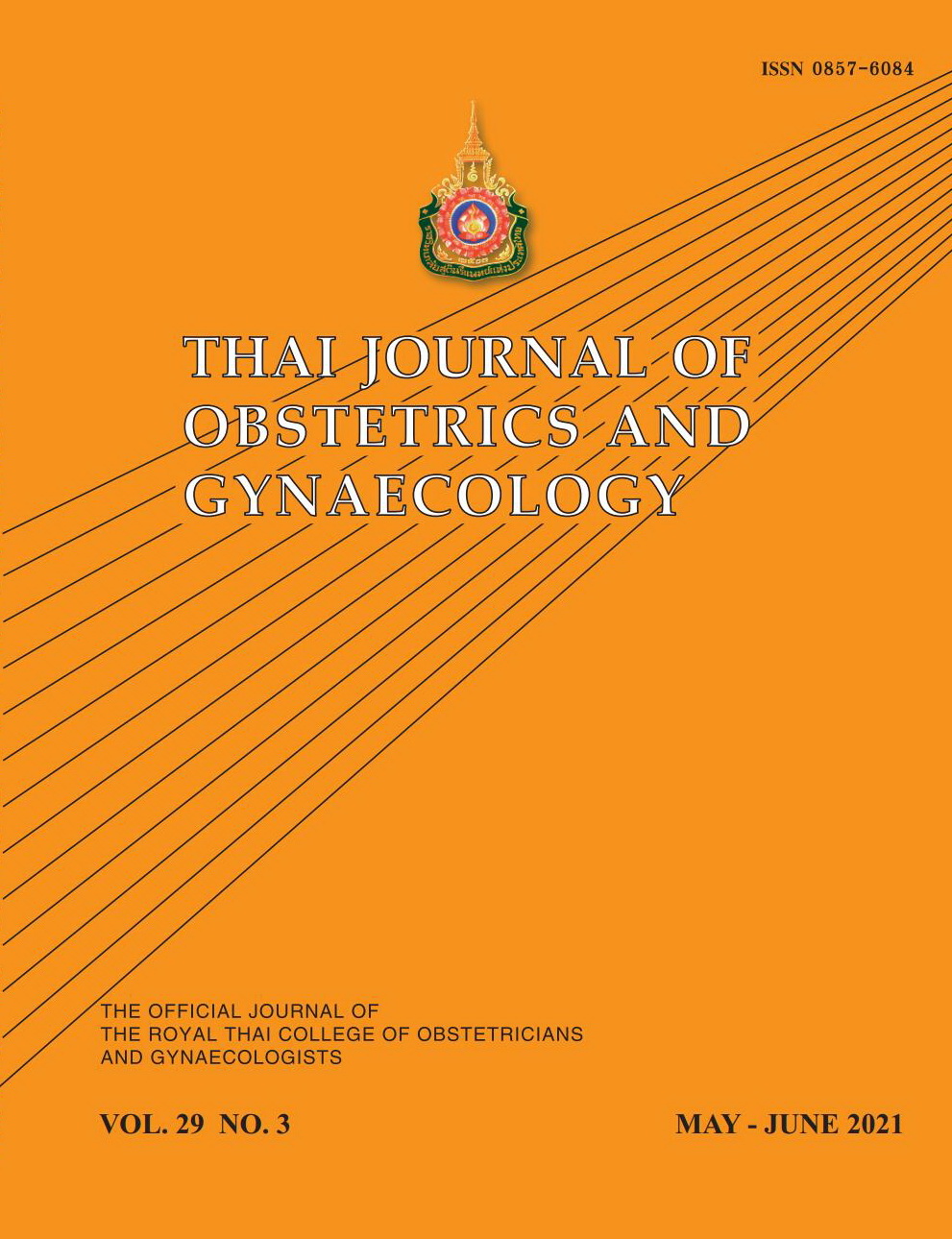Verbal, Mirror-assisted Feedback Instructions vs. Conventional Instructions for Pelvic Floor Muscle Training to Prevent Urinary Incontinence in Late Pregnancy: A randomized controlled trial
Main Article Content
Abstract
Objectives: To study the efficacy of verbal feedback with mirror-assisted pelvic floor muscle training (PFMT) for prevention of urinary incontinence in late pregnancy.
Materials and Methods: One hundred and sixteen nulliparous singleton pregnant women without urinary incontinence were randomized into two groups, the study group was individually instructed verbal feedback using mirror for twelve weeks of training by standardized physician to perform PFMT. The control group received only educated PFMT. Urinary incontinence event, urinary symptoms and quality of life were evaluated by Urogenital Distress Inventory Questionnaire (UDI), Incontinence Impact Questionnaire (IIQ) and incontinence episodes were recorded between 36 and 38 weeks of gestation.
Results: After complete of training the incidence of urinary incontinence was significantly higher in the control group compared with study group (18.2% vs 1.9%, P = 0.008). Urinary symptoms were improved in study group. The quality of life (physical activity, travel and emotion) was a statistically significant better in study group.
Conclusion: Verbal feedback with mirror assisted PFMT was effective for prevention of urinary incontinence in late pregnancy.
Article Details
References
Haylen B, de Ridder D, Freeman R, Swift S, Berghmans B, Lee J et al. An international urogynecological association (IUGA)/international continence society (ICS) joint report on the terminology for female pelvic floor dysfunction. Neurourol Urodyn 2009;21:5-26.
Pelaez M, Gonzalez-Cerron S, Montejo R, Barakat R. Pelvic floor muscle training included in a pregnancy exercise program is effective in primary prevention of urinary incontinence: A randomized controlled trial. Neurourol Urodyn 2013;33:67-71.
Dinc A, KizilkayaBeji N, Yalcin O. Effect of pelvic floor muscle exercises in the treatment of urinary incontinence during pregnancy and the postpartum period. Int Urogynecol J 2009;20:1223-31.
Al-Mehaisen LM, Al-Kuran O, Lataifeh IM, Betawie S, Sindiyani A, Alttal OF, et al. Prevalence and frequency of severity in the north of Jordan. Arch Gynecol Obstet 2009;279;499-503.
Sangsawang B, Sangsawang N. Is a 6-week supervised pelvic floor muscle exercise program effective in preventing stress urinary incontinence in late pregnancy in primigravid women?: a randomized controlled trial. Eur J Obstet Gynecol Reprod Biol 2016;197:103-10.
Fritel X, de Tayrac R, Bader G, Savary D, Gueye A, Deffieux X et al. Preventing Urinary Incontinence With Supervised Prenatal Pelvic Floor Exercises. Obstet Gynecol 2015;126:370-7.
Mason L, Roe B, Wong H, Davies J, Bamber J. The role of antenatal pelvic floor muscle exercises in prevention of postpartum stress incontinence: a randomised controlled trial. J Clin Nurs 2010;19:2777-86.
Herderschee R, Hay-Smith E, Herbison G, Roovers J, Heineman M. Feedback or biofeedback to augment pelvic floor muscle training for urinary incontinence in women. Cochrane Database Syst Rev 2011;6:CD009252.
Floratos D, Sonke G, Rapidou C, Alivizatos G, Deliveliotis C, Constantinides C et al. Biofeedback vs verbal feedback as learning tools for pelvic muscle exercises in the early management of urinary incontinence after radical prostatectomy. BJU Int 2002;89:714-9.
Ko P, Liang C, Chang S, Lee J, Chao A, Cheng P. A randomized controlled trial of antenatal pelvic floor exercises to prevent and treat urinary incontinence. Int Urogynecol J 2010;22:17-22.
Woodley S, Boyle R, Cody J, Mørkved S, Hay-Smith E. Pelvic floor muscle training for prevention and treatment of urinary and faecal incontinence in antenatal and postnatal women. Cochrane Database Syst Rev 2017;12:CD007471.
Sangsawang B, Serisathien Y. Effect of pelvic floor muscle exercise programme on stress urinary incontinence among pregnant women. J Adv Nurs 2011;68:1997-2007.
Bø K, Haakstad L. Is pelvic floor muscle training effective when taught in a general fitness class in pregnancy? A randomised controlled trial. Physiotherapy 2011;97:190-5.
Stafne S, Salvesen K, Romundstad P, Torjusen I, Mørkved S. Does regular exercise including pelvic floor muscle training prevent urinary and anal incontinence during pregnancy? A randomised controlled trial. BJOG 2012;119:1270-80.
Kocaöz S, Eroglu K, Sivaslioglu A. Role of Pelvic Floor Muscle Exercises in the Prevention of Stress Urinary Incontinence during Pregnancy and the Postpartum Period. Gynecol Obstet Invest 2013;75:34-40.
KahyaogluSut H, Balkanli Kaplan P. Effect of pelvic floor muscle exercise on pelvic floor muscle activity and voiding functions during pregnancy and the postpartum period.Neurourol Urodyn 2016;35:417-22.
Manchana T, Bunyavejchevin S. Validation of Thai version of the Urogenital Distress Inventory and Incontinence Impact Questionnaires. Chula Med J 2012;56:37-50.
Cardozo L, Staskin D. Textbook of Female Urology and Urogynecology. 4th ed. Philadelphia: Taylor& Francis Group, LLC 2017:398-404.


